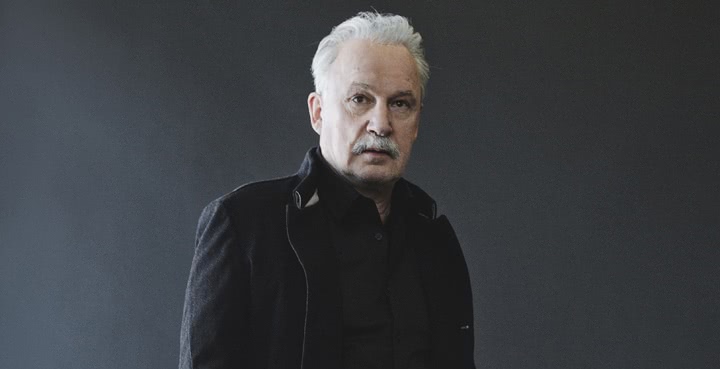Déjà Vu, the aptly titled first solo album from Giovanni Giorgio Moroder in 30 years, almost never happened. In the late ’70s and early ’80s, Moroder was the epitome of musical royalty, and with good reason. The Italian synth pioneer was at the forefront of the disco craze – he produced Donna Summer’s biggest hits of the late ’70s, founded the legendary Musicland Studios in Munich (used by the likes of Electric Light Orchestra, Led Zeppelin and Queen), and worked alongside David Bowie, Freddie Mercury, Blondie and Janet Jackson, to name just a few accolades.
However, following the so-called death of disco in the mid-’80s, Moroder left the music industry to focus on other artistic endeavours, predominately in the film world. Responsible for some of the most iconic film scores of all time (including Scarface and Midnight Express), alongside soundtrack numbers such as Irene Cara’s ‘Flashdance… What A Feeling’ and Blondie’s ‘Call Me’, Moroder has accumulated three Academy Awards, four Golden Globes, four Grammys and more than 100 gold and platinum records. It wasn’t until Daft Punk tapped him on the shoulder for their prog tribute track ‘Giorgio By Moroder’ on 2013’s ubiquitous Random Access Memories,however, that he re-emerged in the contemporary music industry.
“After my work with Daft Punk I began to receive offers from record companies again,” Moroder explains as his wife Francisca pours us a cup of tea. “I got three separate offers to make an album – I would’ve been silly not to take up that chance. If I hadn’t received those offers, this record would never have been made. I’m not a singer. If I was, then I could make an album on my costs and my terms and then try and strike a deal with a label. As an artist/producer, I need the singers. Without a record label behind you, getting these singers is almost impossible. I was really happy to sign with RCA/Sony.”
And oh, did he get singers. Déjà Vu – Moroder’s first album since 1985’s Innovisions – features an extensive cast of the biggest vocalists on the planet, including Britney Spears, Sia, Charli XCX, Kylie Minogue and Kelis.
“A lot of these artists I never actually worked with in the studio,” Moroder says. “It’s the new way. Firstly, you create a track with a certain sort of melody and then give it to the singer. In the case with Sia [on the album’s title track], I created a melodic song and then sent it over to her, and she just recorded the top line. I think that’s what they call it now. She gave it back to me two or three weeks later and it was done, all of the lyrics and the vocals, then I just had to mix it. I actually like this method a lot – there’s a lot less responsibility. The overview is a lot more immediate. I can get it all done and decide much quicker whether or not I like it.
“The most challenging thing about making an album now is the coordination,” he adds. “You need to find the singers, the lawyers, the management. Sometimes you have to wait months to get a reaction from a singer because they’re travelling around the world and just don’t have the time.”
In the ’70s, Moroder was credited with creating the sounds of the future. However, he doesn’t believe this style of producing is possible in 2015. “I’m just trying to make the hits now,” he laughs. “If I knew what the sound of the future was now then I’d be thrilled. These days there’s just no way to make a ‘new sound’. There are just millions out there now. Every day there is a new machine created. Sounds are not going to take you to the future anymore. These days, it’s not just about sounds, it’s about so much more.
“I wanted it to have a modern feel, but I also wanted it to be retro, but not full-on retro-retro. I feel like on a whole it’s a modern record with a touch of the old disco.”
Will fans have to wait another 30 years for another solo album? “I don’t think I’ll be writing another album anytime soon,” says Moroder. “I’ve been getting so busy with my DJing.”
DJing is another rather coincidental career path for Moroder, one that he launched in 2013 at the age of 73. “I was in Paris at the time and I did a little 12-minute job for Louis Vuitton, and then Elton John asked me to play a very small gig for him in Cannes,” he says. “Then the Red Bull Music Academy asked me to play my very first big show for them, and it was a very successful evening. After that I just kept getting more offers, which is actually when I began to learn how to do it. I’ve mixed hundreds and hundreds of songs in my lifetime. I’ve mixed songs with over 60 recording tracks in them. For me to learn how to mix a little DJ set? That’s a piece of cake,” he laughs.
“I’m currently writing the music for a game for Disney. I’ve been offered to be a participant in a musical TV show in Italy. I’m thinking of expanding my DJing, maybe make it more than just about myself – make it ‘Giorgio Moroder and Friends’ and invite some other people and come up with some new ideas. That’s just one of the new concepts I’m currently working on.”



































